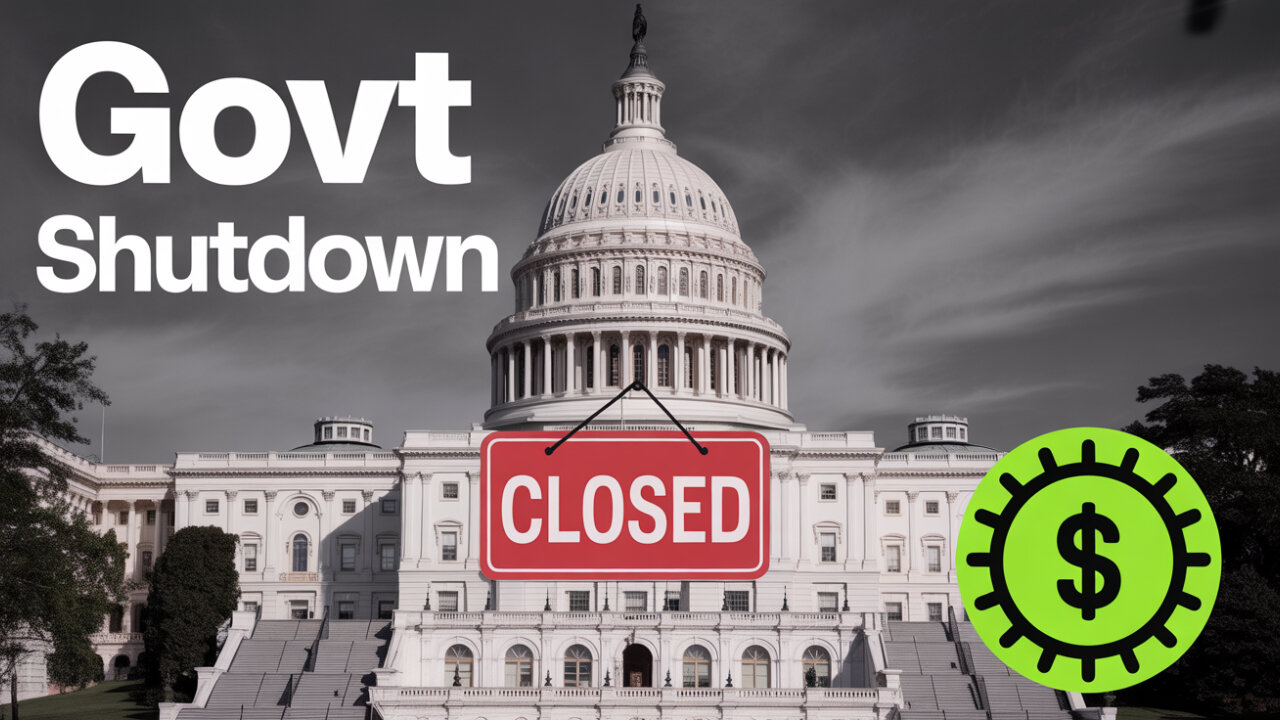Premium Only Content

Shutdowns, Debt, and the Dollar: Are We FAFO-ing the Economy?
Another shutdown, another stress test—and another chance to ask what really matters. In plain English, we unpack what keeps running during a federal funding lapse (think military operations, air traffic control, and core Social Security/Medicare functions) and what slows, clogs, or pauses. The headlines make it sound binary—open or closed—but the real story is friction: delayed paychecks for “essential” employees who still have to show up, agencies operating on skeleton crews, families juggling bills while waiting on back pay, and small ripple effects that compound into real-life stress for people living paycheck to paycheck.
We also dig into the politics of leverage. Shutdown brinkmanship doesn’t happen in a vacuum; it’s staged against a backdrop of more than $35 trillion in national debt, persistent deficits, and election-year incentives that reward short-term wins over long-term discipline. Confidence becomes the hidden variable: confidence in government, confidence in markets, and—ultimately—confidence in the U.S. dollar. When the same drama plays out over and over, it chips at that trust. Investors, allies, and even ordinary savers start asking, “Is this sustainable?” That question matters as much as any budget line item.
Then we talk about the institutions that rarely feel the pinch the same way. USPS is a prime example people bring up—it keeps moving mail even when D.C. fights, but its unique structure, obligations, and politics make it feel insulated compared to a family waiting on a paycheck. Universities are another lightning rod: large endowments and diversified funding can cushion short-term shocks, yet federal flows still matter in complex ways. The point isn’t to villainize; it’s to contrast how different systems absorb pain, and why some seem “untouchable” while workers and small businesses carry immediate risk.
From there we connect the dots to digital money. If repeated shutdowns signal fragility, Central Bank Digital Currencies (CBDCs) are often marketed as a clean technical fix—faster payments, instant disbursements, streamlined policy response. But is that protection or control? We explore both sides: how programmable money could smooth crises and speed relief, and how it could concentrate power in ways that worry civil libertarians, small-business owners, and faith communities that value local autonomy. “Problem → reaction → solution” is an old playbook; we examine whether CBDCs are a genuine solution to recurring dysfunction or a sleek layer over deeper fiscal and governance issues.
We also preview a hard but necessary topic: the intensifying persecution of Christians in parts of Nigeria. Why bring this up in the same episode? Because freedom, stability, and human dignity are connected. Economic turbulence in one place and targeted violence in another both test what we really believe about truth, courage, and community. We share why this matters to American listeners, how to think about reliable reporting, and practical ways to stay informed, pray, and help.
This conversation is faith-anchored and plain-spoken. We’re not here for doom or denial; we’re here to cut through noise, highlight tradeoffs, and offer practical takeaways: steward your household finances with margin, understand where your information comes from, ask better questions of leaders, and keep your hope grounded in something bigger than a budget vote. If you value clear thinking without the jargon, you’re in the right place.
If this episode resonates, hit like, subscribe, and share it with one friend who needs a calm, coherent breakdown of the headlines. Drop your thoughts and respectful disagreements in the comments—we read them, and they shape future episodes.
Disclaimer: This show provides opinion and general information, not financial, legal, or tax advice. Always verify details with up-to-date sources.
-
 LIVE
LIVE
Mally_Mouse
4 hours ago🎮 Let's Play!!: Stardew Valley pt. 34
242 watching -
 2:02:38
2:02:38
Blabs Life
4 hours agoPART 4: Peter Jackson's King Kong: The Official Game of the Movie | Noob Plays
5.49K -
 LIVE
LIVE
Joker Effect
54 minutes agoCLAVICULAR - What the hell is "Looks Maxing"? Asmond Gold is a Demon. KaceyTron. Steve Will do it.
405 watching -
 1:16:43
1:16:43
BonginoReport
10 hours agoExposing Transgenderism w/ Amy Sousa - Nightly Scroll w/ Hayley Caronia (Ep.186)
118K19 -
 1:03:47
1:03:47
TheCrucible
4 hours agoThe Extravaganza! EP: 66 (11/25/25)
74.6K12 -
 1:58:47
1:58:47
Redacted News
5 hours ago"What I saw in Ukraine SHOOK me to my core" Ukraine is not a democracy, it never was | Redacted
116K66 -
 LIVE
LIVE
GritsGG
7 hours ago#1 Most Warzone Wins 4049+!
40 watching -
 LIVE
LIVE
MOONTV69
7 hours ago🔴LIVE - MARVEL RIVALS - GAMBIT LORD GRIND!! (PC)
38 watching -
![Final Fantasy Tactics The Ivalice Chronicles [1st Time Playing]](https://1a-1791.com/video/fww1/bc/s8/1/w/x/p/w/wxpwz.0kob.2-small-Gaming-with-Profitz-LIVE.jpg) LIVE
LIVE
ProfitzTV
4 hours agoFinal Fantasy Tactics The Ivalice Chronicles [1st Time Playing]
18 watching -
 7:24:37
7:24:37
Dr Disrespect
10 hours ago🔴LIVE - DR DISRESPECT - ARC RAIDERS - RANDOM SQUADS
149K12